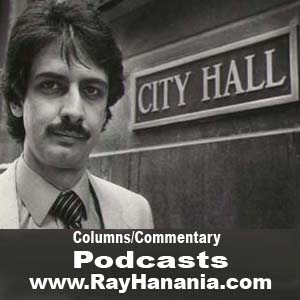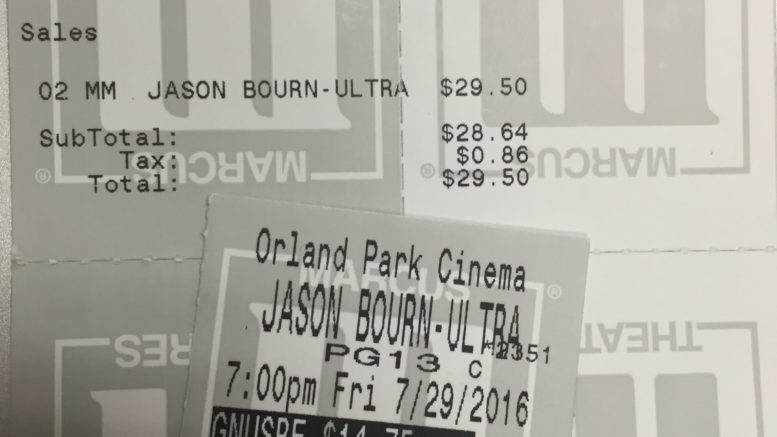This post has already been read 1290 times!
Everyone is talking about “change,” mostly change in politics. But sometimes, too much “change” is not always good. The change that concerns me the most is change in everyday life intended to make life better but always getting in the way of convenience
By Ray Hanania
 Everyone is talking about “change” these days.
Everyone is talking about “change” these days.
It’s one reason why so many people are willing to take a risk with non-politician Donald Trump over insider establishment politician Hillary Clinton.
It’s not about being a Democrat or a Republican. It is about “change.” Despite his sometimes off-the-wall rhetoric, Donald Trump represents change. Hillary Clinton does not.
Sometimes, though, “change” can be too much.
Last week, I went to the Marcus Theaters in Orland Park to watch the premiere of the movie “Jason Bourne.” There have been five in the Bourne series, far less than records set by Star Trek (around 13 including the latest, “Star Trek Beyond”) or James Bond (around 24 with the latest being “Spectre”).
But it wasn’t the movie choice that made me think of “change” because most movie series and remakes like Jason Bourne, Star Trek and James Bond rely heavily on fundamental expectations that can’t change, although they often change the stars for younger actors.

Marcus Theater ticket stub, with seat reservation F8 (Row F, seat 8)
The problem was the movie theater itself. In their constant drive to stay competitive, Marcus decided change would be great, by numbering and creating “reserved” seating.
Instead of getting to the theater early, buying tickets and grabbing whatever seats are available, you pick your seats when you arrive at the counter when you purchase your tickets.
But Marcus did a poor job of implementing the system. When the lights are on and the theater is empty, it’s easy to read the row letters in the aisles and the seat numbers. But when the lights are out and the theater is dark, you can’t read anything.
I knew where my seats were because I had just picked them. But ever since Marcus installed the seat reserve system, movie-goers have been pre-buying tickets and arriving late. And I mean late, after the actual movie starts.
The late-comers practically ruined the movie. About 60 percent of the movie goers at the almost sold out Ultra Screen theater waited until the movie started before entering the theater to find their seats.
That left dozens of people wandering the aisles blocking views and distracting the rest of us who got there on time.
The beginning of a movie is critical to the entertainment experience. Ruin that and you ruin the film. Of course, this Bourne film wasn’t that great, which made the Marcus theater experience even worse.
Click here to listen to this column, or use the widget below.
Lots of people were frustrated because they couldn’t find their reserved seats. They grabbed whatever seats were available. There were many disputes, including one involving an elderly disabled couple with a metal cane. They took the reserved seats of two younger people who called the usher to sort it all out. Loudly. While the movie was playing.
You know how they make a big deal of telling you to turn off your cell phones because bright lights and noise distract the movie experience for everyone else? Well, they had to use cell phone lights to sort it all out. The first 5 minutes of the Jason Bourne movie were consumed with five people flashing lights that were blinding in the dark, and talking loudly about the seating problem.
The couple next to me said people grabbed their “reserved” seats, so they had to take someone else’s seats. Arguments were everywhere and they didn’t settle down until 30 minutes into the film.
Despite the annoyance, I felt relieved I got to the theater 30 minutes early, like I always do. I just couldn’t imagine coming late and telling a disabled elderly couple who were sitting in “my” reserved seats that they had to move.
Change. It might be great for government. But I just don’t think it’s always good for everyday things like movies.
One change Marcus theaters should consider: change the outrageous ticket prices. $15 for a movie ticket? Bring back the $6 crappy seats. Just get people seated sooner.
FOOTNOTE: Would you ask a disabled elderly couple to leave your reserved seats if this happened to you? Let me know by sending me an email to [email protected].
ALSO, as another FOOTNOTE:
After I wrote this column and turned it in to the Southwest News newspaper group for publishing this week, I received an email from Marcus Theaters asking me to rate my experience.
I gave that specific experience a 7 out of 10 and sent the survey on its way. The next day, I did receive a nice email from the theater manager, and of course, it always makes me consider criticism I have made. Clearly, the theater wants to do the right thing, even if I found the experience annoying and worth writing about.
In fairness, here is what the Marcus Theater Manager wrote:
Dear Mr. Hanania,
Thank you for your feedback. We have ushers that assist with seating, in this case it looks like they might have gotten pulled away for another job duty. For that i do apologize. We will definitely be more diligent in making sure that someone is in the auditoriums to help our guests find their seats. As far as the reserved seating goes. If someone purchases their tickets either on line or at the box office that is their receipt of seeing the movie. Unfortunately we cannot control when people decide to come attend the movie. It would be very considerate if individuals would show up before the movie starts. This way no one’s movie going experience can be interrupted. If it will help, when you come back to visit us, you can inform the box office cashier or a manager that you need assistance with seating and we will be more than happy to help you with that.
Thank You,
(Ray Hanania is an award winning former Chicago City Hall reporter and columnist. Email your thoughts to him at [email protected].)
RayHananiaINN
Hanania covered Chicago political beats including Chicago City Hall while at the Daily Southtown Newspapers (1976-1985) and later for the Chicago Sun-Times (1985-1992). He published The Villager Community Newspapers covering 12 Southwest suburban regions (1993-1997). Hanania also hosted live political news radio talkshows on WLS AM (1980 - 1991), and also on WBBM FM, WLUP FM, WSBC AM in Chicago, and WNZK AM in Detroit.
The recipient of four (4) Chicago Headline Club “Peter Lisagor Awards” for Column writing. In November 2006, Hanania was named “Best Ethnic American Columnist” by the New American Media;In 2009, he received the prestigious Sigma Delta Chi Award for Writing from the Society of Professional Journalists. Hananiaalso received two (2) Chicago Stick-o-Type awards from the Chicago Newspaper Guild, and in 1990 was nominated by the Chicago Sun-Times for a Pulitzer Prize for his four-part series on the Palestinian Intifada.
Hanania writes columns for the Southwest Community Newspaper Group including the Des Plaines Valley News, the Southwest News-Herald, the Regional News and the Reporter Newspapers.
Latest posts by RayHananiaINN (see all)
- Hanania joins DuMont on Radio Sunday Aug 14 on national politics - August 6, 2016
- Sometimes too much “change” is not good - August 4, 2016
- “Law and order” today and 50 years ago - July 29, 2016





